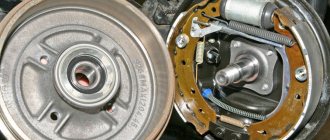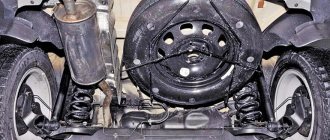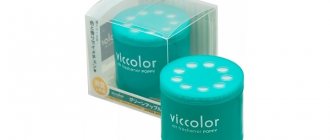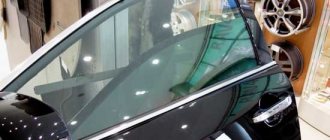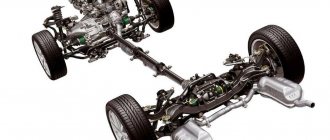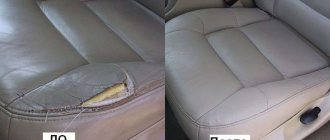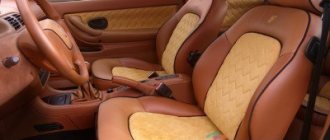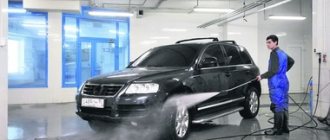The first reason is that many of us open the doors in our cars more often than in our own homes. During just one trip home from work, the driver, on average, opens the car door at least four times. And then these statistics are true if a person was driving directly home from work.
And how many trips can there be in a day, when you opened and closed the door at the beginning of the journey and did the same at the end, or, for example, you stopped at the store, or forgot something in the car and returned. Well, you understand, in general.
The creaking in the car - fight!
Let's find out how to deal with the problem? How to properly lubricate car door hinges and locks. To begin with, it is better not to let it appear at all. That is, it is better to make a rule for yourself: lubricate the doors periodically, without bringing the situation to a critical point. But this, of course, is ideal. In practice, our psychology contains the “truth”: until the roast rooster pecks... and so on.
Where does the door squeak come from?
First of all, the cause of this problem is unfavorable weather conditions (strong wind, snow, rain). Plus the frequent use of doors and the wear and tear of rubber bands, which are responsible for tightly connecting the doors to the car body.
So, the door in your car began to creak. What to do? Should I run to the auto store or use improvised means - different oils that are stored in an assortment at home on a utility shelf or in the garage and used in everyday life? Previously, car enthusiasts did not think much about this issue. The hinges were lubricated with literally anything that came to hand. Vinegar, kerosene and even iodine were used.
We do not recommend that you use such extreme means now. It is better to choose a more reliable and repeatedly proven product that can penetrate the gaps between the rubbing parts of the door hinge and create a film that prevents further friction.
How often to lubricate
Most car enthusiasts lubricate the hinges as needed: when a squeak occurs. Experts believe that this approach shortens the service life of the mechanisms, and it is better to avoid signs of lubricant depletion. In this case, protection should be applied two to four times a year, choosing moderate weather conditions (both heat and extreme cold are contraindications for the procedure, since the performance properties of the lubricant are reduced).
Both experts and car enthusiasts agree on the issue of winter protection. In autumn, in dry weather, but before frost, you need to lubricate the hinges. This will protect them not only from creaking, but also from icing. Winter lubricant must be resistant to cold, temperature changes and moisture (after the engine warms up, the ice on the body and in the door cracks naturally turns into water).
Regular maintenance is guaranteed to save you from squeaking and other problems associated with lubrication. However, if neither a timely nor an emergency change of layer helps, this indicates a malfunction of the mechanism or a defect in the door - in this case, you will have to contact the salon for diagnostics.
Car door lubricants
Experts say that it is ideal to use frost-resistant, long-lasting anti-corrosion lubricants, which also have a low percentage of friction and are resistant to moisture. Important: when choosing a lubricant, be guided primarily by reviews of friends, and not by price.
Not always what is expensive will suit your car. So why overpay? In the automotive environment, products such as, for example, Liquid Moly spray or universal lubricant WD-40, popularly known as “Vedeshka,” have proven themselves well.
Effective lubricants
After reading the top five, you will learn how to lubricate a car door to prevent squeaking:
- Liqui Moly Wartungs Spray Weiss.
- Wurth HHS 2000.
- CRC-MULTILUBE.
- Permatex 80075.
- Klever Ballistol-Silicon Spray.
Liqui Moly Wartungs
Liqui Moly is a common whitish-colored product containing microceramics. It has anti-corrosion and moisture-repellent characteristics, prevents the penetration of dirt particles into the door mechanism for a long time and reduces friction of structural parts.
Liqui Moly Wartungs Spray Weiss is a specialized product designed for processing movable parts, keyholes, hinges, rods, etc. The product is based on mineral oil. Temperature range of application - from -30° C to +250° C.
Advice! The Liqui Moly Wartungs composition can be used to coat not only hinges, but also all kinds of moving parts of a car.
Wurth HHS 2000
Wurth HHS 2000 lubricant is a product of German manufacturers that has won the special love of car enthusiasts. Car owners liked the lubricant due to its rapid thickening, excellent adhesive and penetrating properties, and good stickiness. Ideal for application to door hinges, locks, stops. The product is resistant to strong water pressure and prolongs the service life of mechanisms, even those operating under high pressure.
The main highlight of Wurth HHS 2000 is its rapid transformation from an aerosol to a thick lubricant. Thanks to this property, it reaches hard-to-reach places and remains there for a long time, protecting elements from moisture and reducing friction. The operating temperature range is from -30° C to +180° C. The main disadvantage is the adhesion of grains of sand, dust, and other debris. Plus - low cost.
CRC-MULTILUBE
A universal lubricating composition with high penetrating and water-repellent characteristics. Gets into the most difficult areas of mechanisms, creating a durable protective film. Thus, it significantly reduces the friction of the joints and prolongs their service life. Retains original lubricating properties even with sudden temperature changes.
Multilube has a distinctive feature - a bright blue color, which indicates areas not yet covered with the composition. Thanks to this, the car owner immediately sees where the lubricant is applied. A few days after processing the mechanisms, the product becomes discolored.
Permatex 80075
Permatex 80075 is a colorless lubricant that perfectly protects moving parts of door hinges from wear. Extends the service life of mechanisms and has high anti-corrosion properties. It is in a liquid state in the container, but at the moment of spraying it turns into foam. This allows the compound to reach hard-to-reach places, protecting hinge elements and keyholes from wear and squeaking.
Klever Ballistol-Silicon Spray
One of the materials used not only for processing metal parts, but also spare parts made of plastic, rubber and rubber. Provides a sliding effect of rubbing elements, significantly extending the service life of door “joints”. The spray contains silicone, which allows it to be used at any time of the year - both in cold and heat.
Attention! The universal fluid WD-40, known to most car enthusiasts, or simply “Vedeshka”, has excellent anti-corrosion properties, but quickly washes out the lubricant.
Eliminating squeaking car doors
It's time to figure out how to properly eliminate the unpleasant squeaking of car doors. You can do this during the next scheduled maintenance or simply by stopping at a service station. Or you can fix the problem yourself.
Hinges usually creak, that is, they are a source of annoying sound. First, make sure there is no grease on all door hinges. Perhaps those that you rarely use have enough lubricant and there is no need to treat them. However, if there is lubricant, but there is a layer of dirt on it, it is better to re-treat all the hinges of the car.
After inspection, remove any remaining dust, dirt and remaining grease from the surface. Then you need to treat the hinges with grease, it is sold in stores, but you can use Litol or Solidol (they are no worse and many are even more familiar with foreign or unknown analogues).
Treat the areas that rub against each other with this grease; you do not need to touch the remaining parts. It is important to very thoroughly clean the hinge elements from dirt, otherwise further work will be done in vain!
After all preparatory work is completed, treat the surfaces with a special product. It can be applied with a brush or using a syringe. But usually modern lubricants are sold in the form of a spray, which is ten times more convenient. In this case, you just need to spray the substance from the can onto the hinges.
Masters praise the Molikot Multigliss product. It is suitable for all cars and combines, in addition to the properties listed above, resistance to weather extremes
How to choose a lubricant for locks and hinges
How to Lubricate a Wheel Bearing Without Removing the Hub
Once upon a time, to solve the problem of frozen locks and squeaky doors, drivers used the most sophisticated methods. For these purposes, kerosene, vinegar-based acid, and even iodine, which was in almost every first aid kit, were used. Now, this time has already passed, and the materials at hand have long been replaced by automotive chemicals, which cope well with various door problems.
Let's start with the car door hinges. Any lubricant should easily penetrate into the contact points of all rubbing parts. The complex of properties should calmly ensure the formation of a special protective film on the surfaces of the parts, which will protect the mechanism from excessive friction and preserve its original function. For this purpose, special silicone additives or WD-40-based liquid have long been used.
How to properly perform work to eliminate squeaks?
We have already found the source of the unpleasant sound - the door hinges. Now we need to decide how to properly “cure” them. We have already removed dirt from the rubbing surfaces. Let's start lubrication. To do this, we need to help the product penetrate into all the cracks of the loops, and at the end lubricate the limiter. Then we move directly to the loops themselves.
No need to fill the loops from above! A special container is provided for their lubrication. It is located under the cap. The lubricant must be poured there, and then close this container with a cap. In order for the lubricant to be distributed evenly over the hinges, you need to open and close the doors at least ten to twenty times.
If the squeak persists, you may not have cleaned the surfaces thoroughly or may not have lubricated all the hinges. Another option is that the door could have already sagged, and its lubrication would not have saved the situation. In general, instead of guessing on the coffee grounds. They will not only be able to find out what is causing the problem. but also quickly eliminate it.
Limiter device
Products for lubrication and removal of syrolites
To replace a door, the procedure is the same as for attaching hinges, so it’s better to do two and speed up the work.
There are many specific products on the market to eliminate, over time, the problem of unnerving and annoying noises in doors, windows and window frames. It is called and is a set of lubricant products designated for different purposes. Also interesting are the ways in which different products are distributed; Different lubricants are available in different packaging, with a sprayer, a dispenser or two dispensers, depending on the problem that needs to be solved. As previously mentioned, often the reason for squeaking door hinges lies in a lack of lubrication. You can replenish it with special lubricants; fortunately, there are a great many of them in stores.
The following lubricants can be considered the most effective.
- WD-40 is a universal lubricant, available in the form of a spray and oil. It copes with the task perfectly: it ensures ease of movement of elements, cleans the mechanism of dirt and prevents the formation of corrosion.
- Solidol is a high-density grease. Very popular for processing any moving mechanisms.
- Litol is a lubricant known for its frost resistance and waterproof quality. Often used in outdoor work.
- Cyatim is another effective multi-purpose lubricant that can help if you have a squeaky door in your home.
In addition to special industrial lubricants, other methods of processing hinges using available household products are known.
Causes of squeaking
It's called Yes and it allows you to lubricate deeply, dissolve grease, resin and much more.
It is a product made using the principles of limonene, which enhances the cleansing and degreasing effect, leaving a pleasant aromatic perfume and is equipped with a special straw dispenser, allowing easy and precise use. Many times you will have to have a door that never stops crawling into your house, which in the early morning will try to open slowly so as not to disturb your date or your companion, but with very poor results. Usually your efforts turn out to be useless, and the hated mistake always ends with the awakening of your spouse.
Among them:
- vegetable oils;
- petrolatum;
- wax, paraffin;
- pencil lead.
The process of treating the hinge mechanism with a lubricant is very simple. Although a beginner might still need a few tips on how to lubricate door hinges.
- The most convenient way is to lubricate door hinges with a special nozzle with a tube, like the WD-40 spray discussed above. If you don’t have one, then a simple syringe will do the job.
- Excess lubricant should be removed with a dry cloth.
- Parts that show abrasion require increased attention. They should be cleaned of dirt and thoroughly treated with lubricant.
- The main hinge mechanism is located inside, so this part needs to be lubricated especially well.
It should be said that the process of applying lubricant to the hinges is the same for any door, be it interior, metal or balcony. The processing progress may vary only depending on the type of loops installed.
In this case, the noise can be eliminated by simple lubrication. Thanks to the straw, you can direct the lubricant with precision, without getting messy all over the place. If lubricant alone is not enough or the hinges are very dirty, remove the door, clean the hinges with a small watercolor, apply lubricant as in the previous point, and reposition the door.
Reasons for squeaking on door hinges
For this operation, we recommend that you have two people holding the door up and the other person having to insert it back into the support pin once the operation is complete. Does it sound like you're in a horror movie every time you open the door? Do you wake up at night with creepy sounds from the next room? Do your neighbors complain that their children always wake up when you move from the room to the kitchen and back? Time to get closer to the hinges, technically speaking on door curtains.
Processing the hinges will be most effective if the door is removed. To do this, the door needs to be lifted, for example, using a crowbar. Then apply lubricant to all elements of the hinge mechanism, both on the leaf and on the door frame.
After this, the door is hung back. In order for the product to be distributed evenly in the mechanism, the door must be opened and closed several times. Wipe off excess lubricant with a dry cloth.
Some people don't mind the hinges on the door, others can't calm them down. I had a neighbor who actually damaged the hinges so he didn't bother me that night. Pivot hinges mean that the door hinge is free of lubricant, respectively. The old grease has dried out. There is friction between the two metal surfaces and the rotation is transferred to the surface of the door which resonates like the sound of a musical instrument and we hear a typical sound like a scary movie.
You can lubricate the hinges with oil or grease. However, we use both methods in other cases. It is best to lubricate the hinges when the door is new and put it in the door frame. Check the rods on the door frame for contamination, such as paint, and apply a thin layer of lubricant. Besides specialty types such as food grade silicones, there are two main types of petroleum jelly: regular and water pump. If you don't have a door in the open air, in the wind and rain, you're just in a small box, you'll get it for life.
If the door is installed on permanent hinges (also called universal hinges), then the lubricating compound is applied to the gaps between the hinges.
The occurrence of squeaking door hinges can be avoided if they are periodically cleaned of dirt and treated. This will prevent abrasion of parts and corrosion. If the hinges are already susceptible to corrosion, they should be cleaned with a special rust-corroding agent.
In essence, everything is very simple - there is a rod that is rigidly attached to the car body on one side and to the door itself on the other side. It enters the door through a special opening, inside of which there are usually plastic bushings.
There are one or several tubercles on the rod, which are necessary for the door to be fixed in the required positions so that it does not close, say, from the wind.
We suggest you read why red spots appear on apple tree leaves
Of course, the metal rod quickly wears out the plastic bushings and to prevent this from happening, you need to apply a certain lubricant (more on this a little later).
But when this lubricant becomes scarce (it simply wears off), or it becomes dirty, then squeaks begin to appear.
I’ll start with perhaps the most neglected case - when your door not only creaks, but also clicks unpleasantly. What it is?
As I wrote above, plastic bushings can wear out over time, so the rod begins to dangle in them, and often it clicks there (and creaks disgustingly when opening)
There is nothing that can be done here; you need to remove this structure and change the inserts. Fortunately, repair kits are now sold for almost all brands of cars. Replaced it, lubricated it, no problem.
Remember to repair clicking limiters and especially to smear them with something - USELESS!
When do you need to lubricate car door hinges?
The answer is simple: after washing, for example, with Karcher and before winter, when the risk of acquiring an irritant in the form of a creaking door increases. In this case, lubricating the door locks and hinges of the car is simply necessary!
Agree, it’s nice to get into the car without hearing the disgusting sound of a creaking door, which constantly and constantly, with the meticulousness of a university professor, reminds you that the hinges need to be lubricated at least sometimes, and not let the situation take its course.
Share information with friends:
Why do hinges begin to creak?
Creaking door sounds occur for several reasons, and they often appear in cars with a short service life:
- multiple opening/closing;
- unfavorable weather conditions;
- wear of the rubber bands responsible for the tight fit of the door to the body;
- poor-quality factory lubricant;
- door sagging;
- poor quality assembly of components, which is especially noticeable in domestic cars;
- very frequent washing of the car, because water, coupled with chemicals, washes out the lubricant;
- washing the car too rarely, as a result of which the lubricant becomes clogged with dirt.
However, even with systematic care of a good quality car, there is a possibility of door squeaks.
Prevention of door locks. Recommendations from a specialist.
Petrovsky Autocenter, in the useful tips section, talks about how to avoid problems with door
,.
The industry produces the following types of lubricants:
- ring (solid oils, which are divided into ordinary and press solid oils);
- complex ring (uniols - Uniol-1, Uniol-3, Uniol-3M);
- sodium sodium-calcium (lubricant 1-13, fatty constolin - UT-1, UT-2, YAN3-2);
- lithium (litol - Litol -24, Fiol-3, Fiol-1, Fiol-2, Fiol-2M, Severol -1, CIATIM -201, LSC-15);
- barium (VTV-1).
Liqui Moly Turschloss-Pflege - lubricant for lock cylinders
COMPOSITION FEATURES
Liqui Moly Turschloss-Pflege is a special lubricant for door lock cylinders. It has a special formula that is safe for special internal coatings of door lock cylinder parts. Prevents lock cylinders from freezing in winter. Protects parts from corrosion.
Composition of Liqui Moly Turschloss-Pflege:
• designed for maintenance and lubrication of built-in locking locks;
• ensures reliable lubrication and flawless operation of locks;
• has excellent anti-corrosion properties;
• displaces moisture;
• prevents locks from freezing in winter;
• neutral to varnish surfaces, plastic and rubber.
Liqui Moly Turschloss-Pflege provides safe lubrication of lock cylinders, preventing them from freezing and extending their service life.
APPLICATION
Before using Liqui Moly Turschloss-Pflege lock cylinder lubricant, it is recommended to shake the can well. After this, you need to insert the valve tube into the cylinder and spray the aerosol into the locking lock. Remove excess composition with a napkin.
What is required from a lubricant?
Since locks are not only a rather complex mechanism, but also operate under extreme conditions, somewhat increased demands are placed on their lubricants. They must meet the following queries:
- be resistant to washing off
. Moreover, this point concerns not only water: utility workers with their anti-icing chemicals add unpleasant moments to locks. So the lubricant composition simply must be resistant to alkalis, salts and acids; - successfully combat corrosion. Anti-rust lubricant, of course, will not replace rust, but it should be able to localize the emerging source;
- tolerate low temperatures.
In the Russian winter, no one needs a lubricant that becomes stiff at -10; - have an insignificant coefficient of friction
- otherwise it simply will not meet its purpose; - duration of exposure. Indeed, no one is interested in lubricating the lock every day.
The composition of any lock lubricant must be homogeneous: strange inclusions may well jam the cylinder of a car lock on their own.
Choosing the right product
To make doors easier to open and avoid squeaking, the auto products market offers a huge range of all kinds of products.
At the same time, it is not entirely clear which lubricant is possible, necessary, and which is completely undesirable to treat door locks.
The choice depends little on the machine itself. I can’t say that door squeaks are the prerogative of cheap cars. Extraneous sounds can appear on any machine:
- Kia Rio;
- Hyundai Solaris;
- VAZ 2110;
- Nissan Qashqai;
- VAZ 2114;
- Daewoo Lanos;
- Chevrolet Aveo;
- Mitsubishi Galant;
- Honda Civic;
- Renault Duster;
- Audi A4;
- BMW 3;
- Nissan Teana, etc.
It all depends on the operating conditions and the owner’s attitude towards his car.
I strongly advise you not to wait for noise to appear, but to carry out preventive treatment.
Practice clearly shows that there is a category of preferred means. But we can also identify those lubricants that are not suitable for processing door hinges.
It is better to lubricate car doors using grease. This is due to their characteristic properties:
- penetrate well into thin cavities;
- can seep deep into the loop;
- maintain a long-lasting effect;
- even after evaporation they leave a protective film;
- additionally protect against friction and wear;
- do not lose properties at different temperatures;
- are not afraid of sudden temperature changes;
- are relatively cheap;
- have a minimal coefficient of friction;
- additives in the composition have an anti-corrosion effect.
But the traditional method of solving all problems in the form of WD40 should be abandoned. The effect, if any, will be only short-term. Vedashka is not intended for such purposes.
If there is no composite product, take lithol or simple motor oil. But their efficiency is lower compared to composite lubricants.
Although litol helps, at the same time, due to its stickiness, it actively attracts debris, dust, sand, etc. They can cause accelerated wear of rubbing parts. The situation is similar with oil. Plus its service life is even shorter than that of lithol.
Causes and consequences
There are four reasons why you have to lubricate the locking mechanism.
Dust
One of the common causes of deterioration in the functioning of a door lock is dust that gets inside over time. Gradually, the dust particles gather into a dense lump, which is mixed with iron filings. This significantly worsens the movement of the bolts installed in the locking mechanism.
Most often, this problem is faced by residents of private houses whose front door is located on the street.
Abrasion of parts
Some people think that keyhole problems can only be caused by dust, but this is not true. Often the mechanism begins to malfunction due to poor care. The parts begin to rub against each other, which accelerates the wear of the locking device parts. As a result, a lot of metal shavings appear inside, which begin to rust.
Rust
Another common problem that can cause a lock to work less well is rust. Most often, corrosion appears on a metal surface due to increased humidity levels. If rust is not removed in a timely manner, corroded parts will gradually begin to corrode. This will cause the mechanism to jam.
This problem is common among residents of dachas, private houses and cottages, since their front door lock is located on the street.
Poor sliding of moving parts
There are special parts installed inside the locking mechanism that must move smoothly. Without lubrication, their sliding deteriorates significantly, which leads to the lock jamming.
Lubricants: characteristics
Lubricants intended for lubricating vehicle are divided into:
- liquid (oils);
- semi-solid (plastic lubricants);
- solid (molybdenum disulfide, graphite).
By destination:
Based on the basis and nature of the raw material:
- mineral;
- semi-synthetic;
- synthetic;
- vegetable.
A lubricant is a substance that has a base with the addition of various additives and other substances to impart the necessary qualities. The basic composition includes the following components:
Lubricants have certain characteristics:
- viscosity;
- strength;
- frost resistance and thermal conductivity;
- lubricity;
- physicochemical stability;
- mechanical stability;
- adhesion;
- water resistance;
- anti-wear properties;
- anti-corrosion properties.
The main characteristics of lubricants depend on the thickener that is included in the composition and its name is part of the name of the lubricant.

